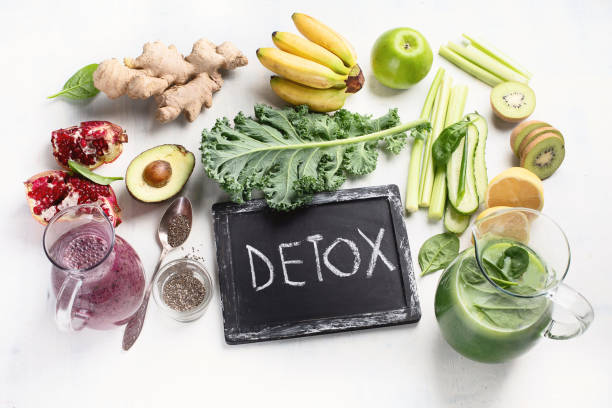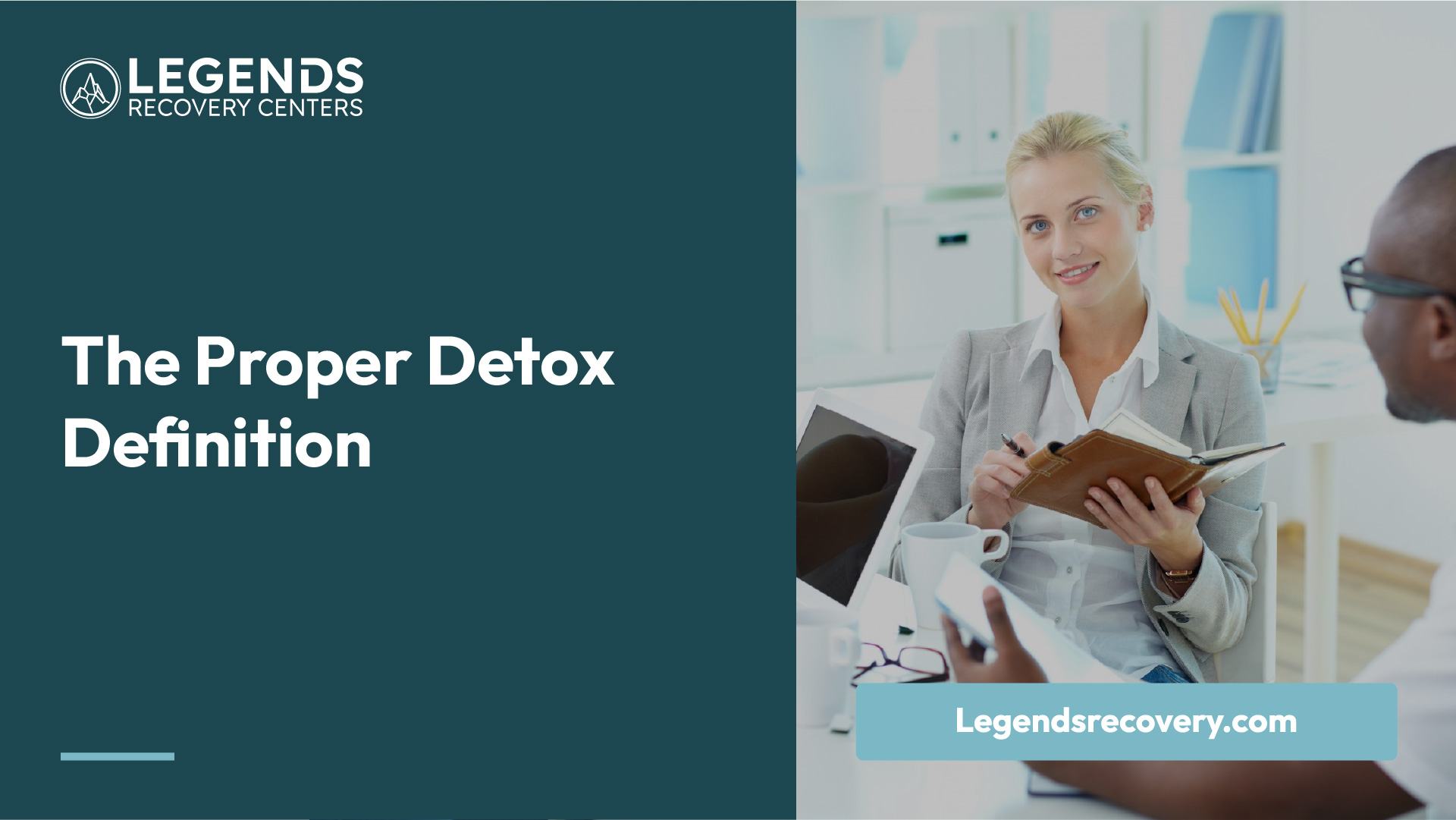Discover the proper detox definition and unravel the truth behind detox diets. Get informed and stay healthy!

Detoxification is a term often used in various contexts, but it fundamentally refers to the body's process of removing toxic substances to maintain overall health and well-being. Let's explore the origins of detoxification and its modern interpretation.
Detoxification is not a new concept and has been practiced for centuries. Ancient healing systems, such as Ayurveda and Traditional Chinese Medicine, recognized the importance of eliminating toxins from the body to promote balance and vitality. These systems emphasized the use of herbs, natural remedies, and lifestyle practices to support the body's detoxification processes.
In modern times, the definition of detoxification has evolved to encompass various approaches and methodologies. True detoxification is not a diet or a quick fix but rather a lifestyle or a daily act of self-care [1]. It involves making conscious choices to support the body's natural detoxification processes through nutrition and lifestyle habits.
The body has a built-in detoxification system that operates around the clock to eliminate harmful substances. The main organs involved in this process are the liver and kidneys, but the lymphatic system, digestive tract, skin, and lungs also play a role in detoxification. These organs work together to filter and eliminate toxins, waste products, and excess substances from the body.
Detoxification is essential because exposure to harmful toxins over time can lead to damage to internal organs or contribute to the development of diseases. By supporting the body's natural detoxification processes, we can help remove detrimental toxins and minimize the potential risks associated with their accumulation.
It's important to note that the term "detoxification" is also used in the context of substance abuse treatment. In this context, detoxification refers to a set of interventions aimed at managing acute intoxication and withdrawal to minimize physical harm caused by the abuse of substances. This type of detoxification focuses on the medical management of acute withdrawal and is distinct from the broader concept of detoxification as a lifestyle practice.
Understanding the origins and modern interpretation of detoxification provides a foundation for exploring the natural detoxification process, detox diets, and their potential benefits and risks. By adopting healthy lifestyle practices and supporting the body's detoxification efforts, we can strive for optimal health and well-being.

Understanding the natural detoxification process of the body is essential in comprehending the concept of detoxification. Detoxification is the body's ongoing process of removing toxic substances to maintain overall health and well-being. This process involves various organs working together to eliminate harmful substances and waste products.
The body has a remarkable built-in detoxification system that operates continuously to keep us healthy. The main detoxification organs include the liver, kidneys, lymphatic system, digestive tract, skin, and lungs. Each of these organs plays a crucial role in eliminating toxins and waste products from the body.
The main organs involved in the body's natural detoxification process include the liver, kidneys, lymphatic system, digestive tract, skin, and lungs. Each organ has a specific role in eliminating toxins and waste products, ensuring the body's overall detoxification.
OrganFunction in DetoxificationLiverProcessing and eliminating toxinsKidneysFiltering waste products and excreting them through urineLymphatic SystemTransporting white blood cells to fight infections and toxinsDigestive TractProcessing and eliminating toxins through bowel movementsSkinAllowing detoxification through sweatingLungsEliminating particles through nasal hairs, mucus, and exhaling
Detoxification is crucial for maintaining optimal health and well-being. By eliminating toxins and waste products, the body can function more efficiently. Detoxification supports various bodily functions, including metabolism, hormone regulation, immune system function, and overall cellular health.
By understanding the body's natural detoxification process and the role of each organ involved, we can make informed choices to support our body's detoxification system. Incorporating healthy lifestyle practices and avoiding excessive exposure to toxins can further enhance the body's natural detoxification capabilities. However, it's important to note that detoxification should be approached with caution, and any detox program or therapy should always be done under medical supervision.
Detox diets have gained popularity in recent years as a way to cleanse the body and improve overall health. However, it's important to have a clear understanding of what these diets entail, their effectiveness, and potential side effects.
Detox diets are generally short-term dietary interventions designed to eliminate toxins from the body. These diets often involve fasting followed by a strict regimen of fruits, vegetables, and juices. Some detox plans may also include herbs, teas, supplements, or colon cleanses [4].
The idea behind detox diets is to remove toxins and impurities that may accumulate in the body due to environmental factors, processed foods, or other lifestyle choices. However, it's important to note that the body has its own built-in detoxification system, primarily through liver function, feces, urine, and sweat [4].
Despite their popularity, there is little to no scientific evidence supporting the effectiveness of detox diets in removing toxins from the body. The body's natural detoxification system is highly efficient, and it is capable of eliminating toxins without the need for external interventions. Detox diets may lead to short-term weight loss and improved metabolic health due to calorie restriction, but these effects are often not sustainable in the long term [4].
A review conducted in 2015 found no compelling research to support the use of detox diets for weight management or eliminating toxins from the body. It's important to approach detox diets with caution and rely on evidence-based strategies for maintaining overall health.
Detox diets can have potential side effects and risks. Severe calorie restriction, a common component of detox diets, can lead to fatigue, nutrient deficiencies, and other health complications. Additionally, the use of supplements and laxatives in some detox plans can increase the risk of overdosing and adverse effects. These diets may also have negative impacts on at-risk populations, such as pregnant individuals, individuals with certain medical conditions, or those with a history of disordered eating.
It's important to consult with a healthcare professional before embarking on any detox diet to ensure it is safe and appropriate for your individual health circumstances. They can provide guidance and help you make informed decisions about your dietary choices.
In conclusion, while detox diets may seem appealing as a way to cleanse the body, their effectiveness in removing toxins is not supported by scientific evidence. It's crucial to focus on long-term, sustainable lifestyle changes, such as maintaining a balanced diet and engaging in regular physical activity, to support overall health and well-being.
Detoxification is an essential component in the continuum of healthcare services for substance-related disorders. It is important to differentiate detoxification from substance abuse treatment and understand its essential components and role in healthcare services.
Detoxification is a set of interventions aimed at managing acute intoxication and withdrawal, with the goal of minimizing the physical harm caused by substance abuse. It focuses on the immediate medical management of acute withdrawal symptoms rather than resolving the underlying psychological, social, and behavioral problems associated with substance abuse. Detoxification is not substance abuse treatment and rehabilitation, which involves a comprehensive approach to address the broader aspects of addiction.
Detoxification involves three essential components: evaluation, stabilization, and fostering the patient's entry into treatment [3].
Detoxification is an integral part of the healthcare system's response to substance-related disorders. It plays a vital role in preventing and managing the immediate health risks associated with acute intoxication and withdrawal. Nontraditional healthcare settings, such as emergency rooms and medical wards, should be prepared to participate in the process of getting patients quickly into detoxification programs to prevent negative consequences linked to substance abuse [3].
Moreover, detoxification programs should address psychosocial issues that may affect the delivery and effectiveness of detoxification services. By addressing the medical, psychological, and social aspects of substance abuse, detoxification programs can provide a comprehensive approach to support individuals on their path to recovery.
Understanding the proper definition and components of detoxification is crucial for healthcare providers, policymakers, and individuals seeking help for substance-related disorders. By recognizing the distinct role of detoxification and its place within the broader context of substance abuse treatment, we can better support individuals in their journey towards sustained recovery.
To support the body's natural detoxification process, there are various practices that can be incorporated into one's lifestyle. These practices aim to enhance the body's built-in detox system and promote overall well-being.
The body has a remarkable built-in detoxification system that works tirelessly to keep us healthy. The liver, kidneys, digestive tract, lymphatic system, respiratory system, and skin all play vital roles in eliminating toxins and waste from the body. To support this natural process, it is important to focus on nutrition and lifestyle practices.
Detox Support Practices
Table based on information from Nourished by Nutrition
By incorporating these practices into your daily routine, you can contribute to the optimal functioning of your body's detoxification system and promote overall health.
Detoxification is not a diet or a short-term intervention. It is a lifestyle or a daily act of self-care. Optimal health results from a gradual and sustainable approach to changing nutrition and lifestyle habits. Here are some lifestyle practices that can support the detoxification process:
By adopting these lifestyle practices, you can create a supportive environment for your body's natural detoxification process.
In addition to supporting the body's detox process through nutrition and lifestyle practices, there are various detoxification programs and therapies available. These programs often combine specific dietary approaches with additional techniques to enhance the detoxification process. Some examples include:
Detoxification programs and therapies should always be approached with caution and under the guidance of qualified professionals. It is important to choose reputable programs and seek advice from healthcare providers who can assess your individual needs and guide you through the process.
By combining supportive nutrition and lifestyle practices with appropriate detoxification programs and therapies, you can take a proactive approach to optimizing your body's detoxification system and promoting overall health.
When considering detoxification methods, it is crucial to evaluate the potential health risks and benefits. Understanding the risks associated with detox diets and the benefits of proper detoxification can help individuals make informed decisions about their health. Additionally, recognizing the importance of medical oversight during the detoxification process is essential for a safe and effective experience.
Detox diets have gained popularity due to claims of improving the immune system, digestion, energy levels, and aiding in weight loss by eliminating harmful compounds and chemicals from the environment and diet. However, there is little to no scientific evidence supporting these claims. The body is naturally equipped with its own detoxification mechanisms, primarily through liver function, feces, urine, and sweat [4].
Engaging in detox diets may lead to various risks and negative effects. Some of these risks include:
While detox diets may lack scientific evidence and carry potential risks, proper detoxification in a medical and controlled setting can offer several benefits. Medical detoxification focuses on acute intoxication and withdrawal, often as a crucial initial step in substance abuse treatment and rehabilitation. The benefits of proper detoxification include:
Proper detoxification, when integrated into a comprehensive healthcare approach, can significantly contribute to the well-being and recovery of individuals struggling with substance-related disorders.
Medical oversight is essential during the detoxification process to ensure safety and optimal outcomes. Healthcare professionals can provide critical support, monitoring, and intervention as needed. By working closely with medical professionals, individuals undergoing detoxification can receive personalized care, appropriate medication management, and psychological support throughout the process.
Detoxification programs should be prepared to promptly admit patients from nontraditional settings, such as emergency rooms and medical wards, to prevent negative consequences associated with substance abuse. The involvement of psychosocial support systems can also enhance the effectiveness of detoxification services.
In summary, understanding the risks associated with detox diets, recognizing the benefits of proper detoxification, and appreciating the importance of medical oversight are crucial aspects of the detoxification process. Consulting with healthcare professionals is recommended to ensure a safe and effective detoxification experience tailored to individual needs.